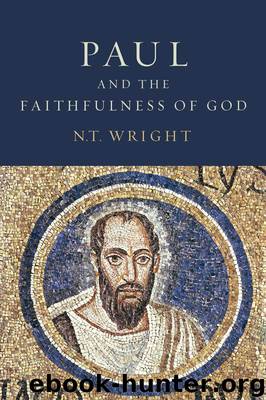Paul and the Faithfulness of God: Two book set (Christian Origins and the Question of God) by Wright N. T

Author:Wright, N. T. [Wright, N. T.]
Language: eng
Format: epub, pdf
Publisher: Fortress Press
Published: 2013-11-01T00:00:00+00:00
if ‘righteousness’ is through the lawthen the Messiah died for nothing
in parallel with, and completing the thought of, verse 16:
one is not ‘righteous’ by works of the lawbut through the Messiah’s faithfulness
not on the basis of works of the lawwe might be declared ‘righteous’
on the basis of the Messiah’s faithfulness
I conclude, in other words, that there are six things are going on here.
First, Paul understands the saving death of the Messiah in terms of his loving self-giving, construed as his great act of covenant faithfulness to Israel’s God.240
Second, he understands this action as drawing to its divinely ordained focal point the entire story of the election of Israel (that is why he can say ‘the grace of God’ in verse 21, as a further way of referring to what has happened on the cross), and redefining it around the Messiah, who has at last offered to the covenant God the ‘faithfulness’ of Israel.
Third, Paul understands that redefinition as the outworking of the Messiah’s death and resurrection. The boundaries of Israel are not merely slackened or tightened, a few key adjustments here and there; they are radically redrawn. The boundaries of God’s people now consist of the Messiah and his death and resurrection, and as a result Israel itself – here referred to by Paul with this deeply poignant autobiographical ‘I’ – has been put to death and raised to new life. This, we should note in relation to wider debates, has nothing whatever to do with the replacement of Israel by something else (as in the so-called ‘apocalyptic’ interpretation) but everything to do with the fulfilment of the divine purpose for Israel in and through Israel’s own representative Messiah.
Fourth, Paul refers here movingly to his own journey of death and new life, not for its own sake but in order to explain that this is true of all who belong to the Messiah. He now shares, participates, finds himself caught up in, the Messiah’s death and resurrection: he is ‘crucified with the Messiah’, and he now ‘lives within the faithfulness of the son of God, who loved me and gave himself for me’. This ‘participation’ in the Messiah is the heart of the passage. It is, I suggest, the basis for the status of ‘righteousness’, and for the act of ‘justifying’ by which God creates that status.241 I do not think, however, that ‘being in Messiah’ and ‘being justified’ are the same thing, as we shall see later.
Fifth, in 2.20a Paul adds a subtly different note. I am, he says, alive, ‘but it isn’t me any longer, it’s the Messiah who lives in me’. This indwelling of the Messiah himself in the believer is reflected in other passages such as Romans 8.9–11, where there is a fluidity between the indwelling Messiah and the spirit (also called ‘the spirit of the Messiah’ and ‘the spirit of the one who raised the Messiah from the dead’). It also anticipates the notion of ‘the Messiah being formed in you’ in 4.19. This, again,
Download
Paul and the Faithfulness of God: Two book set (Christian Origins and the Question of God) by Wright N. T.pdf
This site does not store any files on its server. We only index and link to content provided by other sites. Please contact the content providers to delete copyright contents if any and email us, we'll remove relevant links or contents immediately.
The Five People You Meet in Heaven by Mitch Albom(3561)
The Secret Power of Speaking God's Word by Joyce Meyer(3182)
Real Sex by Lauren F. Winner(3014)
Name Book, The: Over 10,000 Names--Their Meanings, Origins, and Spiritual Significance by Astoria Dorothy(2979)
The Holy Spirit by Billy Graham(2944)
0041152001443424520 .pdf by Unknown(2843)
How The Mind Works by Steven Pinker(2813)
ESV Study Bible by Crossway(2774)
Ancient Worlds by Michael Scott(2682)
Churchill by Paul Johnson(2578)
The Meaning of the Library by unknow(2565)
The ESV Study Bible by Crossway Bibles(2550)
The Gnostic Gospels by Pagels Elaine(2527)
MOSES THE EGYPTIAN by Jan Assmann(2412)
Jesus by Paul Johnson(2352)
City of Stairs by Robert Jackson Bennett(2347)
The Complete Dead Sea Scrolls in English (7th Edition) (Penguin Classics) by Geza Vermes(2277)
The Nativity by Geza Vermes(2227)
Ancient Near Eastern Thought and the Old Testament by John H. Walton(2223)
